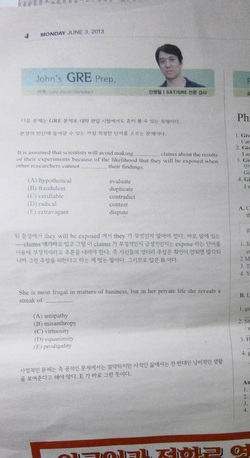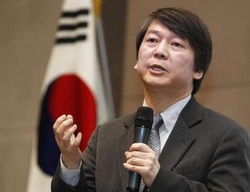Thursday, June 6th, was a holiday in honor of the soldiers who died in the Korean War (perhaps, see below).
We were off. Looking back on my other “June 6ths” in South Korea:
June 6th, 2009: I was still settling in to my job in Ilsan. I did not yet have my Alien Registration Card, so I did not yet have a bank account or a phone (I had rejected the offer of my boss to pay me in cash, although I did subsequently run out of money a few days before I’d gotten the ARC around mid-June; Luckily, my predecessor had left me hundreds of coins, which I used to buy ramen for sustenance — I didn’t mind; it was all part of the ride, I thought. I also refused to tap into my U.S. funds, thinking it best to keep as a back-up). / I have no memory of a June holiday in my early time at the Ilsan job. Looking at the calendar, I see that June 6th fell on Saturday in 2009. Korea has no tradition of transposing weekend-falling holidays onto Mondays, as we do in the USA. [Note: In some alternate universe in which I’d chosen to stay at D’berry, the company I worked for during the better part of 2008, June 6th 2009 would have seen me having been awarded the one-year certificate the company gave out, along with perhaps a little bonus, a few weeks earlier. I liked D’berry. See post-13 for a roundabout way of telling why I decided to not get back in with that company in early 2009.]
June 6th, 2010: On May 1st, 2010, I’d moved out of Ilsan bound for Suwon, leaving my packed suitcase in the care of my closest Korean friend, Cho B.W. I lived in very cheap but fine lodging in Suwon until June 10th (with a 10-day[?] trip to China in the middle of that period). My idea was to just live-in-Korea without working for a while. I flew back to the USA on June 10th. / I have no memory of there being a “holiday” in the final days of my time in Suwon. Again, I see it fell on a Sunday in 2010. / On June 6th, 2010, I was excited by my upcoming travelling in the USA, including to the Grand Canyon — with a childhood friend, A., and some of his relatives — and my visits to my own extended family in Iowa. / Later, I’d try to get back in with D’berry. They wanted me, they said. I waited. By late fall 2010, I realized it would not happen: The GIS department has been gutted; I remember a full office, I came in to ‘interview’ to see a mostly-empty office; most people had been fired, moved away, or nudged into early-retirement between summer 2008 and fall 2010. I’ve thought about this decision a lot since then, and whether it was the right one or not.
June 6th, 2011: I was not in Korea.
June 6th, 2012: A Wednesday. I was about to hit the nine-month mark at the Bucheon job (which I began in Sept. 2011). A British coworker had invited me and about 10 others friends/coworkers to a baseball game between two Korean teams in Seoul. It was a fun day, and a day I will not soon forget. After the game. the group split up. Three of us — me, my coworker-friends C.H. (a tall and humorous American), and B.S.Y. (a not-very-tall but also good-humored Korean), went to the Yongsan War Memorial Park, at my suggestion. I think of that as my favorite place in this country because (a) It’s so non-busy/peaceful, and (b) There’s lots of interesting stuff to look at. Following this, we had a dinner of a soup called buddae-jiggae and then home. This baseball game and visit to the Yongsan Memorial were some of my friend C.H.’s last meaningful activities in this country, as he flew back to the USA early on June 9th.
June 6th, 2013: A Thursday. I am now about to hit the 21-month mark at this Bucheon job. I regret staying on for this second year-contract. The job has grown to really depress me and angers me, at times, for a lot of reasons, which I have tried to keep off this blog for sake of avoiding negativity. / On the 2013 holiday, I visited Song-do Island in south Incheon (an artificial island that feels more like an American downtown, minus the lurking potential for street crime, than any place I’ve been in Korea), and then the Sinchon neighborhood of Seoul.
_____________________________________
Note on South Korea’s Memorial Day (현충일):
In the days before June 6th, 2013, I asked some students about the holiday. Did it commemorate only soldiers who died fighting under ROK command in the Korean War? Or was it also for “all” Korean soldiers who’d ever died while under arms, in previous centuries? / Or, was it actually commemorating all those who’d served in the South Korean armed forces (as our veterans’ holidays in the USA do, I think). That is improbable, because in South Korea, the latter would “commemorate” almost all the Korean men alive today, due to universal conscription. In fact, the 7th, 8th, and 9th graders I asked didn’t seem to know, but the consensus was that it was only for Korean War dead. / I also cannot figure out why the holiday is on June 6th, which, as far as I know, has no significance to Korean War history.


